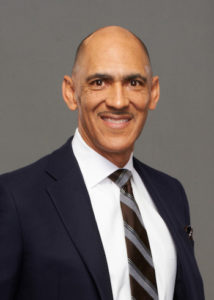
Tony Dungy
Tony Dungy was born on this date in 1955. He is a Black (retired) football player, coach, and sports analyst.
From Jackson, Michigan, he grew up in a family that valued intellectual accomplishments as much as athletics. His father, Wilbur, is a retired physiology professor. His mother, Cleome, was a high school English teacher. Dungy's siblings include a sister who is an obstetrician, another who is a nurse, and a brother who is a dentist. Dungy was drawn to football at an early age. As a graduate student at Michigan State University, his father would watch Detroit Lions football games with the six-year-old Tony. While the elder Dungy concentrated on his studies, his son also kept him aware of the score and player statistics.
Young Dungy starred in basketball and football at Jackson's Parkside High School. By the end of his freshman year, he attended the University of Minnesota and made the starting lineup. It became clear that Dungy's approach to the game was cerebral. Dungy spent his spare time watching game films and analyzing his opponents. As quarterback for the Golden Gophers from 1973 to 1976, Dungy finished his college career ranked fourth in total offense among all players in the history of the Big Ten conference.
He signed as a free agent with the National Football League Pittsburgh Steelers, where he was converted into a defensive back. Dungy made the team on the strength of his understanding of the defense the Steelers were running and his ability to anticipate the moves of opposing receivers based on long hours of study. In one 1977 game, he performed a rare feat by both making and throwing interceptions in the same game.
In 1978, his second season with the Steelers, Dungy led the team with six interceptions and helped lead the Steelers to a Super Bowl championship. The Steelers traded Dungy to the San Francisco 49ers in 1979; he was shipped to the New York Giants after a year. The Giants cut Dungy toward the end of the 1980 pre-season. Dungy retired with nine interceptions over three seasons because he had no future as an active player.
At 25, Dungy became the NFL’s youngest assistant coach when hired by the Pittsburgh Steelers in 1981. Coach Dungy and his wife Lauren have five children. In 1982, he was promoted from defensive assistant to defensive backs coach before becoming the league’s youngest defensive coordinator in 1984 at age 28. He served as defensive backs coach at Kansas City (1989-1991) and as defensive coordinator at Minnesota (1992-95).
Dungy held a 54-42 record as head coach with Tampa Bay from 1996-2001, qualifying for the playoffs four times in six seasons. Dungy produced some of the NFL’s stingiest defenses at Tampa Bay. His units ranked no lower than 11th in his six seasons. Still, at the end of the 2001 season, composed perseverance was not enough to save Dungy's job. The season closed with a 31-9 playoff loss to Philadelphia, and two days later, he was fired.
Dungy began exploring his options, seriously considering a new career in prison ministry. But when the Indianapolis Colts offered him a coaching position, he accepted. He has directed seven of his nine Colts and Buccaneers teams to the playoffs, twice being a conference finalist. Dungy has six career double-digit victory seasons and is the only NFL head coach to defeat all 32 NFL teams.
2005 marked Dungy’s 10th as an NFL head coach. He is the NFL’s most successful head coach from 1999-2004 with a mark of 64-32 (30-18 with Tampa Bay, 34-14 with Colts). In December 2005, tragedy struck him and his family while leading Indianapolis to the best record in the NFL. His oldest son, James, died of an apparent suicide in Tamp Bay, FL.
On January 12, 2006, Dungy retired from coaching. He wants to use his popularity to help people other than football players. Dungy said, "Being the football team's coach has given me a definite platform to reach people I would have never been able to reach."
In 2020, Dungy became the first Black NFL coach inducted into the Professional Football Hall of Fame.